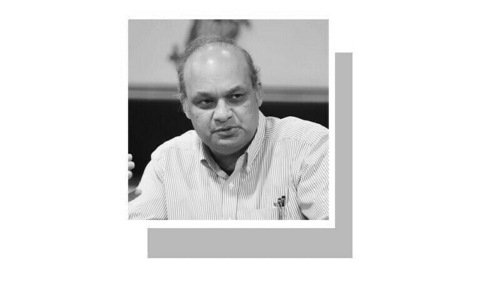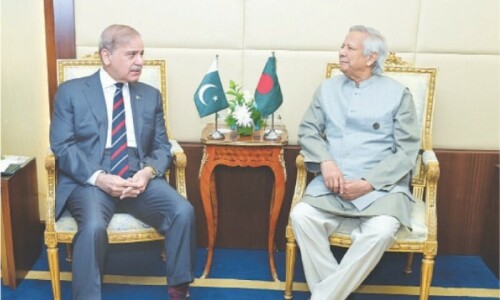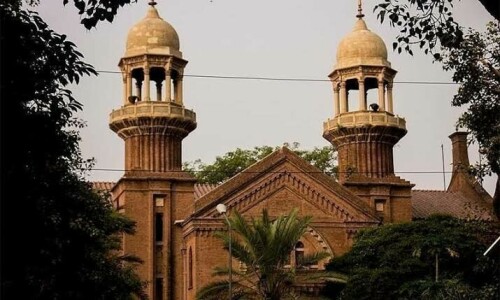What next, is the question on everyone’s minds now that Imran Khan has crossed the Rubicon. Despite the reservations of those around him, as well as the scepticism of those without, the PTI and the PML-Q have dissolved the Punjab Assembly. Khan’s party, the parliamentarians as well as his allies who were said to be the Trojan horse placed there by the establishment, have all gone along with him. Despite the rumours of dissent within and the fears of losing the government, the deed was done. And the PML-N has accepted the move and is now getting ready for an election, instead of trying to delay it.
But as the country gears up for elections, provincial or general, or even a new spanner in the works, here are three factors which will be critical to the developments ahead.
The dissolution: the psychological impact of this decision should not be underestimated. Not just because Khan is now seen as forcing the ruling coalition to react to his decision rather than having a strategy of their own, but also because the PTI has successfully pushed the idea of dissolution ‘reportedly’ being opposed by the establishment. While the PDM also hinted at this, the most vocal evidence came from Parvez Elahi, who said in a recent interview that the establishment was not in favour of early elections. And then came the claims of PTI provincial-level parliamentarians being pressured to not show up for the vote of confidence. From phone calls to threats, it was all hinted at and believed, for just four years ago, the PML-N made similar allegations. But it didn’t work.
So now the perception is that Imran Khan was able to resist or defy the establishment’s pressure, and stood his ground and succeeded. Such is his popularity that the constituency politicians were willing to defy the powers that be to ensure a PTI ticket for the next election. This perception will have an impact on the ‘hawa’ (atmosphere) which plays a key role in the elections in Punjab.
As the country gears up for elections, three factors will be critical to the developments ahead.
The PML-N’s fightback: The PDM has suffered a similar psychological defeat. But this, or even inflation, is not its biggest handicap in the elections to come. The party’s biggest challenge is the mess within the PML-N, where the main leadership continues to be absent for unfathomable reasons.
Shehbaz Sharif is busy playing prime minister, and apparently can’t make time for the party. Oddly enough, he is not even expected to play a political role, which Asif Ali Zardari made time for all through the five years the PPP was in power, and what Khan was criticised for as prime minister because he left politicking to the establishment.
As for the rest of the family, it is apparently sitting in London, miffed. Nawaz Sharif is upset for being pushed into a government in April, then accepting the harsh IMF conditionalities and losing goodwill for the party. And because he is miffed, he has called Maryam Nawaz over, forcing her to take another chhutti (vacation) from politics. In addition, Hamza is miffed because somewhere, someone, decided the party needs a non-Sharif as the face for Punjab chief minister. Or is it because Maryam is being treated as heir apparent by Nawaz? Whatever the reason, he is away too.
As a result, the party has been left to muddle its way through by-elections and more — just consider, the vote of confidence in Punjab was handled by an unelected and young Atta Tarar and Rana Sanaullah, who should be busy with growing terrorism but was, instead, busy in Lahore.
But the PML-N’s success in the coming elections will depend on the family’s ability to put their personal issues aside and focus. And this will require far more than just Maryam Nawaz’ return; the family will have to present a united front and a united view, instead of swinging between aggression and reconciliation. It would do well to remember the party’s support base is rather narrow, for it is limited to central Punjab (unlike the PTI and PPP, which enjoy a stable position in KP and Sindh respectively), and if the PTI makes inroads here, the losses for PML-N can pile up.
It’s the economy: In the midst of all this confusion and the ‘they-are-cancelled-they-are-on’ Sindh local government elections, Ishaq Dar appeared on the screen briefly to announce that petrol prices would remain the same. It was a reminder during this rather hectic weekend that the IMF programme is still far from sewn up — and chances are that the traffic blockade at the port in Karachi, the speculation on the dollar and the larger economic uncertainty will continue.
Unfortunately, with the election in Punjab now due, the PML-N will be even less inclined to finalise the programme and the price hike it will bring. But without the IMF programme, the crisis for the entire country grows bigger.
So, let me stick my neck out and say that this delay in the IMF programme is one indication the PML-N is not planning on an extended stay or even till the end of parliament’s term. If it did want an extended stay, it would have finalised the programme in a hurry to get some breathing space in time for the elections (six months or so after August, as it was rumoured). And even if it expects elections in August, it can’t sustain the current state of affairs without the IMF until then, for the foreign exchange will run out sooner rather than later, say the experts (who are kind enough to explain the economy to me). And perhaps this is what prompted Dar’s brief appearance on Sunday. A personal appearance to promise the Noon supporters that the party did its best to not burden the people, as long as it was in power.
The writer is a journalist.
Published in Dawn, January 17th, 2023









































